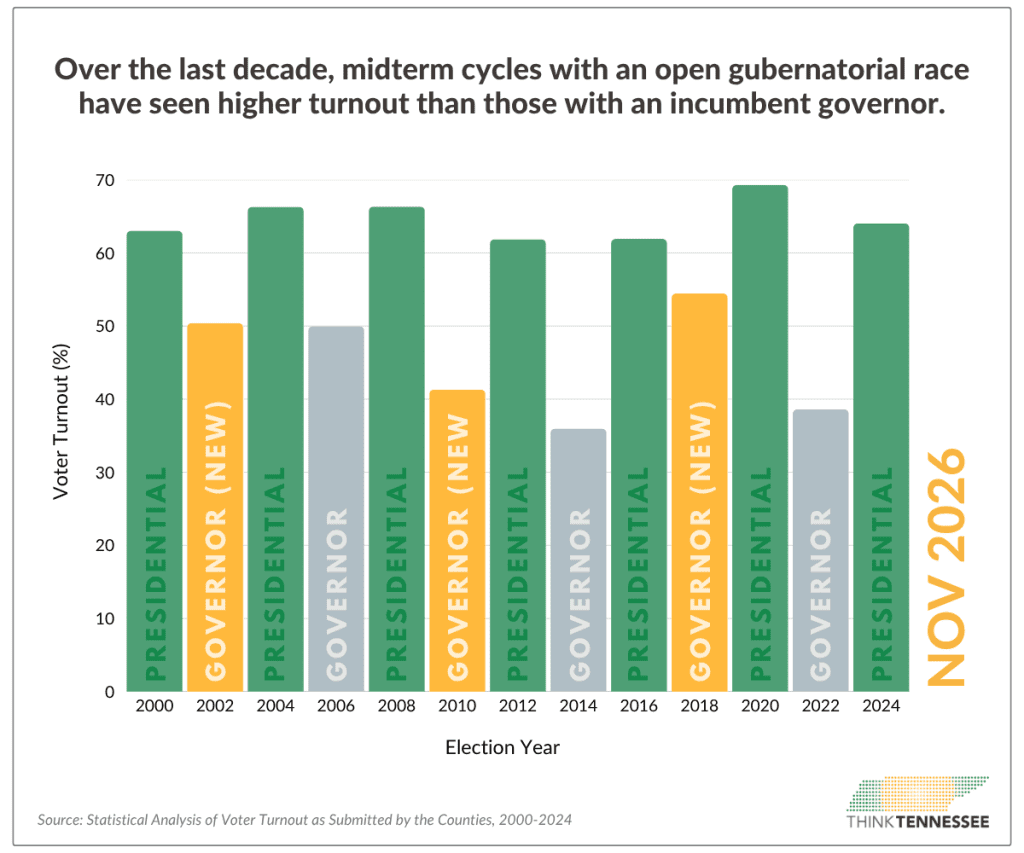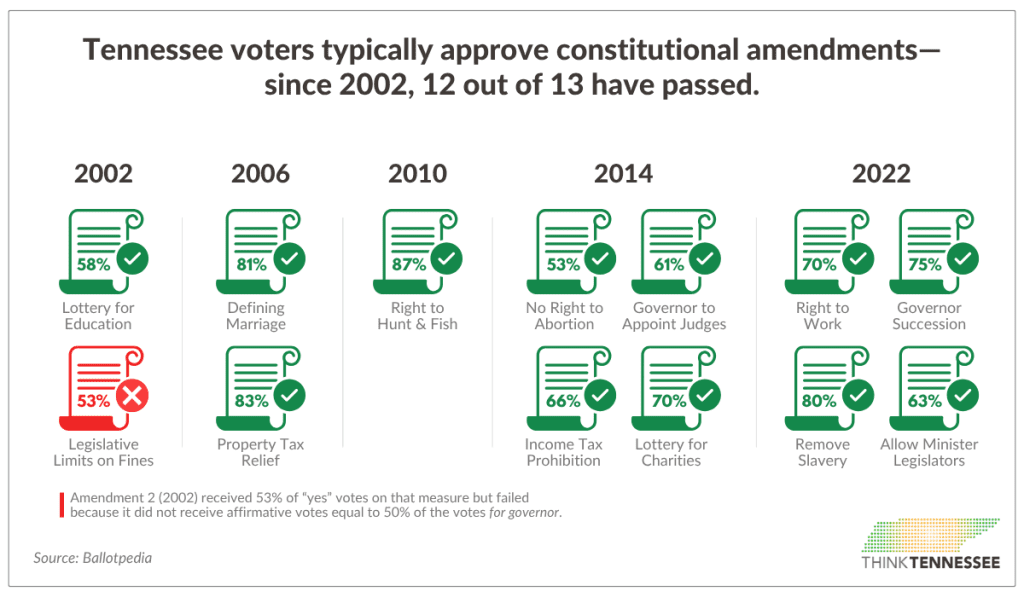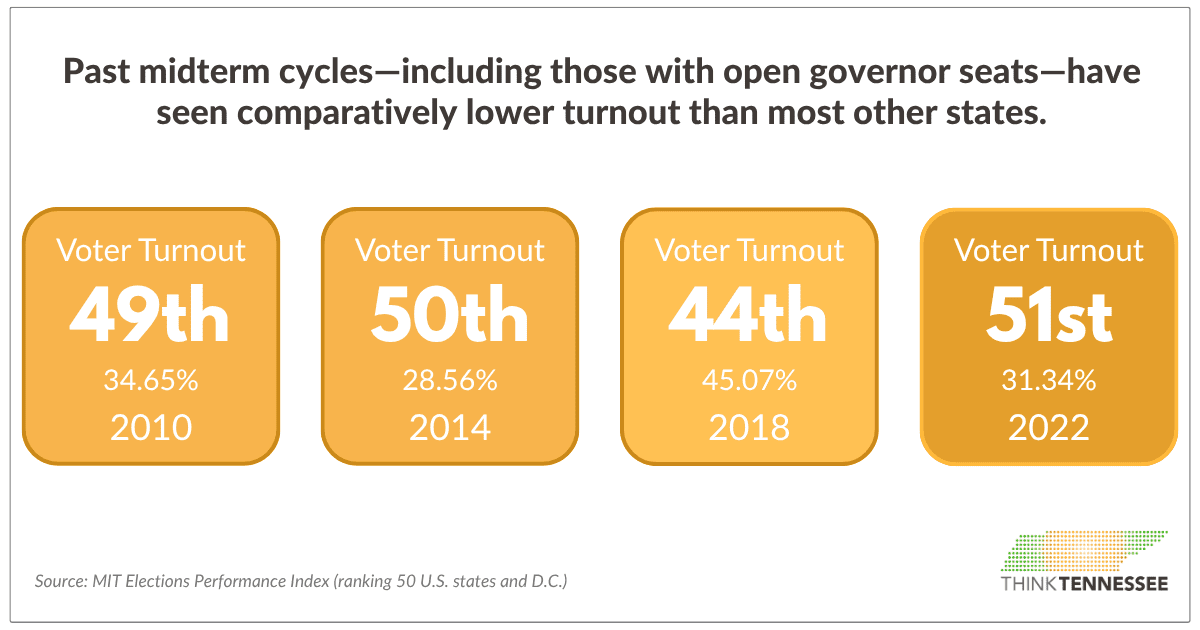
Today marks one year until our next federal and statewide elections. Across the country, voters will head to the polls for the November 3rd midterm elections, which will include races for the full U.S. House of Representatives and about a third (35) of the U.S. Senate seats. Here in Tennessee, voters will also elect state offices: our governor, the full state House, half of the state Senate (the odd-numbered districts), and other judicial and municipal officials, as well as decide whether to approve three proposed constitutional amendments.
Looking ahead to Tennessee’s November 2026 election, we highlight what we can expect for voter turnout based on an open gubernatorial seat, competitive congressional races, and previous voter experiences.
A smaller percentage of Tennessee voters participate in midterms than in presidential cycles, but two factors in November 2026 could drive turnout higher.
An Open Gubernatorial Race: Tennessee’s voter turnout trends show that presidential elections usually have higher voter participation than midterm cycles. However, when the governor’s seat is open, turnout tends to be higher than when we have an incumbent governor. With Governor Bill Lee term-limited, next year Tennesseans will elect a new governor.
Contested Races: Having more than one person to choose from on the ballot can also help drive higher turnout. Our analysis of past state elections found that contested races are a statistically significant predictor of increasing turnout. In midterm years, contested races increased turnout by 8.2 percentage points.
The Republican gubernatorial race and multiple congressional races already have multiple candidates declared, either in primary challenges (impacting August turnout) or opposite party candidates (impacting November).
- Incumbents in Congressional Districts 5 and 9 have both primary and opposite party challengers.
- District 6 is an open race for the first time since 2018 (as the incumbent is running for governor).
- This year’s primary races for District 7’s special election (December 2, 2025) drew multiple candidates from both parties, and the seat will be up for election again.
While these factors may help drive turnout, voter experiences in previous election cycles highlight potential challenges to turnout.
ThinkTennessee has reviewed over 1,600 calls from Tennesseans to a national election protection hotline for the last three federal election cycles—in 2020 (800 calls), 2022 (293 calls), and 2024 (554 calls)—that provide a snapshot of both where Tennessee voters have questions about the election process and where would-be voters are falling through the cracks.
Most calls involve voters asking questions about things like registration or their polling place. For example, of the 741 calls from the November 2022 and 2024 elections, 69.9% were questions that could be answered, while 30.1% were issues that may have prevented ballots from being cast.
Reported issues raised concerns that may impact turnout. Callers have raised concerns about issues such as missing the voter registration deadline because they didn’t know when it was or that they needed to re-register if they had moved to a new county; not appearing on the voter rolls when they thought they were registered; and absentee ballots not arriving on time. With calls coming after deadlines to address these issues, not all would-be voters were able to cast their ballots.
Tennesseans will also decide to support or reject three proposed amendments to the state’s constitution.
To amend Tennessee’s constitution, the state legislature must pass proposed amendments in two consecutive sessions (over a period of four years)—first by a majority vote, then by a two-thirds vote.[i] Once approved by lawmakers, the amendment is placed on the ballot for voters during the next gubernatorial election.[ii] To pass, it must receive “yes” votes greater than 50% of all votes cast for governor.
In the 2026 governor’s race, voters will consider three proposed amendments:
- Removing the Right to Bail for Certain Offenses. This would allow judges to deny bail in specific serious felony cases, including six specific violent offenses and any crimes that require serving at least 85% of a sentence (which includes more than 70 crimes).
- Expanding Victims’ Rights (Marsy’s Law). This would add a set of enforceable rights for crime victims, including the right to be heard in court proceedings and notified of key developments.
- Prohibiting State Property Taxes. This would constitutionally bar the state legislature from enacting a statewide property tax.
In the last few decades, nearly all constitutional amendment questions have been approved by Tennessee voters. Since 2002, just one out of 13 amendments failed—and even then, the measure received a majority of votes but just barely failed to meet the threshold 50% of votes cast for governor.[iii]
How will Tennessee turnout compare to other states?
Given historical trends, we expect higher turnout than we saw in 2022’s midterm cycle (due to the open governor’s seat), but we also expect Tennessee turnout to trail most other states.[iv]
As Tennessee prepares for another election year (beginning with the May 5th State and County Primary), policymakers can consider what changes might help more voters make it to the polls, and voter education and engagement efforts can focus on some of the questions and issues that have consistently come up for Tennessee voters over the past three cycles:
- Updating voter registration, especially after moving,
- When and where to vote, including Early Voting, and
- Eligibility and processes to vote Absentee By-Mail.
But before then, voters in the 7th Congressional District will head to the polls this month to participate in the special election for the House seat.[v] Early voting in the special election runs from Wednesday, November 12 through Wednesday, November 26, leading up to Election Day on December 2, 2025.
Endnotes
[i] Tennessee Const, Article XI, Section 3. A two-thirds majority is at least 22 members in the state senate and 66 members in the state house of representatives.
[ii] Because Tennessee’s legislature meets in two-year sessions, this process typically takes at least four years.
[iii] The one amendment that failed in 2002 (called the “Fine Limits Amendment”) would have given the General Assembly the ability to set the “maximum fine that, absent waiver, may be assessed without a jury.” Although it received 53% of the vote on that specific measure, it failed to receive “yes” votes equal to 50% of the gubernatorial vote, which is the required threshold in Tennessee. See Ballotpedia (providing a breakdown of all TN constitutional amendments since 1968).
[iv] MIT’s Election Performance Index. Tennessee ranked 49th in voter turnout in 2010, 50th in 2014, 44th in 2018, and 51st (last) in 2022—the four most recent midterm years.
[v] The 7th district covers the northern and western third of Davidson County, portions of Williamson and Montgomery Counties and about a dozen rural counties.







